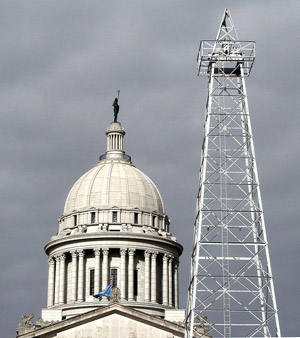
Caption
Cali2Okie / Flickr


Caption
Cali2Okie / Flickr

Cali2Okie / Flickr
Oklahoma is a leading energy producer with an economy increasingly concentrated on the oil and gas industry, economists say.
Oklahoma’s unemployment rate is well below the national average, and it’s among those adding jobs the fastest.
Oklahoma is as much an energy state today as perhaps it’s ever been, according to one economist, and finance officials agree that revenues from oil and natural gas have helped shelter the state from the worst of the recession.
“Booms” are subjective things, but Oklahoma’s energy industry is definitely booming.
But does a boom beget a bust?
During much of the recent recession, Oklahoma’s energy graphs were up. Oil and gas production increased, and total well count completions were at a high point when the worst of the recession struck in December 2007, Oklahoma Corporation Commission data show.

Source: Oklahoma Corporation Commission
The number of completed oil and natural gas wells remained high during the worst of the recession, the shaded portion of the graph.
Revenues from gross production taxes on oil and natural gas have boosted the general fund, and lawmakers are optimistic about a flat state budget this year, an enviable post-recession scenario to be sure.
Oil revenues have been a “bonanza” for Oklahoma, Preston Doerflinger, director of the Office of State Finance said last month.
“We are at a period of time where our economy is as concentrated on the energy industry as it’s really ever been,” said Mickey Hepner, an economist and Dean of the University of Central Oklahoma’s College of Business Administration.
Roughly a quarter of all jobs in Oklahoma are tied — either directly or indirectly — with the energy industry, said Hepner, citing figures from the Bureau of Labor Statistics. When the jobs numbers are taken with the recent growth of big Oklahoma-based energy companies like Chesapeake Energy and Devon Energy, “that does indicate that, perhaps, we are in a boom,” Hepner said.
Oklahoma has a long history with oil — one that predates its statehood — but much of the recent economic activity centers on natural gas, Hepner said. The growth is largely fueled by supply, he said, specifically new drilling technologies like horizontal drilling and hydraulic fracturing or “fracking,” which allows drillers to efficiently extract untapped gas.

Spencer Platt / Getty Images
Abram Loeb, who opposes hydraulic fracturing, wears a gas mask during the last of four public hearings on proposed regulations in upstate New York
But a hydraulic fracturing boom brings a lot of baggage.
The natural gas industry says it’s safe, but a growing consortium of environmental activists and scientists are concerned about contamination from hydraulic fracturing chemicals and wastewater. And some say the process might cause earthquakes.
Whether or not the claims prove true, Oklahoma’s economy is concentrated on a commodity that’s under a lot of scrutiny.
“It does raise a concern,” Hepner said. “If there is a change in that industry, Oklahoma is exposed to it.”
Oklahomans benefit from direct tax revenues from oil and natural gas drilling operations within the state, but Oklahoma’s economy also benefits from energy operations in other states by way of profits — and jobs — for big Oklahoma companies like Chesapeake and Devon.
Environmental concerns over hydraulic fracturing have become a frenzy in Pennsylvania, Texas and other states where Oklahoma companies drill.
“If there is a big environmental backlash against (hydraulic fracturing), that could certainly threaten the profitability of natural gas wells,” Hepner said, which would “negatively impact Oklahoma companies and the state’s economy.”
On the public perception front, T. Boone Pickens thinks the natural gas industry is effectively belaying environmental concerns.
The Oklahoma native, gas and oilman, and billionaire energy investor isn’t an unbiased source on the issue, but his stake — and exposure —in the energy game, particularly with natural gas, runs parallel to Oklahoma’s.
Pickens estimates drillers in Oklahoma, Texas and Kansas have hydraulically fractured roughly 800,000 wells since the early 1950s.
“I’ve personally fracked over 3,000 wells,” he said in a recent interview from his office at BP Capital, his Dallas-based energy investment firm.
Hydraulic fracturing hasn’t created water pollution problems in drilling operations in and around Oklahoma, Pickens said. “I never had a problem with it, and I don’t know of anybody else having a problem with it.”
In Pennsylvania — where Pickens has traveled to speak as a natural gas booster — water contamination stems from improperly plugged wells.
Ironically, it might be energy commodities’ up-and-down nature that evens out the discussion, Pickens said. Natural gas is nearing a 10-year low, and he expects conversations to cool a bit on both sides.
“Here you are with two-dollar and 80-cent gas, so you’re going to have some rigs that are going to be shutting down. It’s going to give everyone time to catch their breath and get field rules and whatever safeguards they want to feel comfortable with the fracking.”